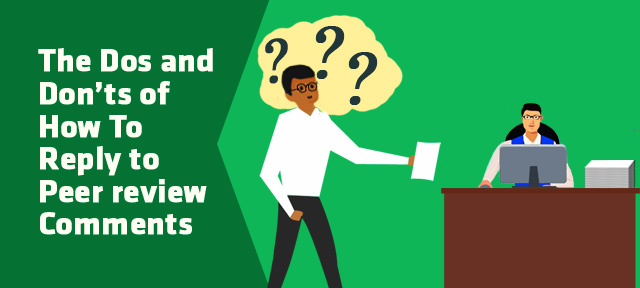Receiving a peer review from a journal can be a daunting experience for a new author. Often an author may feel that the peer review is too harsh, that it fails to get the focus of the research, it refers to some point adequately covered in some other section, etc. However, one must also keep in mind that a peer review provides a reader’s perspective. If a peer review raises certain points, the chances are most readers too would feel the same. If you want the world to know of your research, you must communicate it as suggested by the peer review. Thus, for the sake of polishing one’s publication, it is critical to respond well to a peer review from a journal.

How to respond
It is critical to understand exactly what each comment or suggestion means, precisely what you are asked to consider or alter, and how you are going to address the issue in the publication. It is imperative for you to read the feedback carefully, repeatedly, and in close relation to your manuscript. Consult your coauthors or a colleague if it is a collaborative effort or someone who is familiar with your work. Getting a different person to read the review and the article is often beneficial.
A response to a peer review has to be an entirely new document that now goes along with the edited manuscript. This is an important point to remember; just editing the manuscript for publication does not mean the reviewer will read it all over again to find the changes. Separate responses should be sent to each reviewer. The response letter should begin with a summary of changes, pointing out new data and new analyses performed in response to the most essential criticisms of all the reviewers. If any point by a reviewer has been raised by other reviewers, you need to mention that as well.
Respond to each review
A journal will not consider your research for publication if the editor or reviewer feels the author is sending a half-hearted response to a peer review. Each point of interjection must be addressed with details of the response in the response letter. In case you do not agree with any review, respond to it with justifications why you do not agree, but you cannot simply ignore it.
The response must be crisp, to the point, with proper referencing to the edited manuscript. A journal seeks professionalism from their authors and documents such as peer review responses reflect that. A response should be as thorough as the draft publication. Share new data, new references only as a response to a point if needed, in the proper fashion as you would argue out in your publication.
Conclusion
Your research is as good as your publication. While it is understood that a lot of effort and passion goes into research work, a similar thoroughness is also required for a journal publication, and responding to a peer review is a critical part of that.

